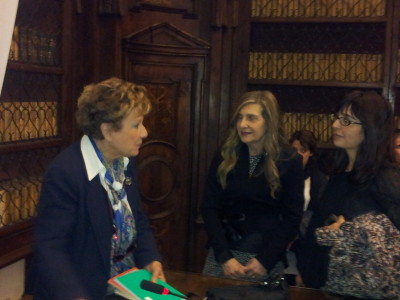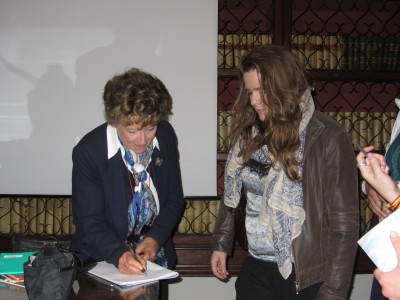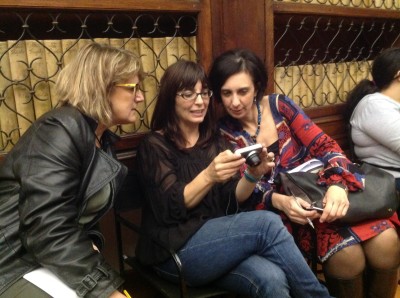
Dacia Maraini, Loredana Tarini and one of the professor o the Italian Department /SUF Luisa Demuru at the conference of Gabinetto Vieusseux
At the conference held at the Gabinetto Vieusseux for the world renown writer Dacia Maraini, a student in the audience observed that language should be considered a code, a method through which we express ourselves and through which we can be understood by others. Dacia Maraini objected, arguing that language is not just an “instrument,” but rather something much more complex, carrying with itself traces of the past, of history, and of the country from which it came.
In fact, Ms. Maraini goes so far as to say that a country’s identity lies in its language. When she thinks of what defines Italy and Italians, she doesn’t think of the flag, or of mutable border lines on a map that geographically divide one region from another; instead, she thinks of the language as representative of the Italian people and their history.

Dacia Maraini at Gabinetto Vieusseux after her conference on “Scrittrici Italiane del Novecento” (Italian Women Writers in 20° Century)
Dacia Maraini’s words reminded me of another scholar who has expressed similar thoughts on the subject. According to David Crystal, “a world in which only one language survived would be a catastrophe of unprecedented intellectual ecology…and it’s a scenario that could, in theory, emerge anytime between now and the next five hundred years” (La Rivoluzione delle Lingue, 2006).
I can’t help but agree with Crystal – linguistic diversity has a value too great to be calculated. Just like their speakers, languages have their own character, identity and their own soul.
From the moment in which we learn a language, we do not wish to merely assimilate its written or spoken expression. Our goal is much deeper than that. It is, above all, to try to truly assimilate the identity and unique character of the country and its language.
Languages are also bridges between various cultures and different identities. Each language, while still maintaining its own identity and individuality, intersects and interacts with other languages. A language can therefore be seen as an instrument for integrating diversity while still recognizing and respecting the unquestionable importance of its unique individualism.
What we need to recognize of each language is the weight and uniqueness of its cultural, social and historical values; much more than its syntax or grammar.
Those of you who are studying or teaching Italian – what are your thoughts on the subject?
* Italian Language and Culture Coordinator SUF

